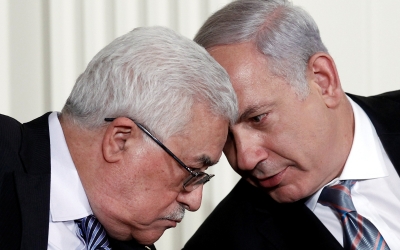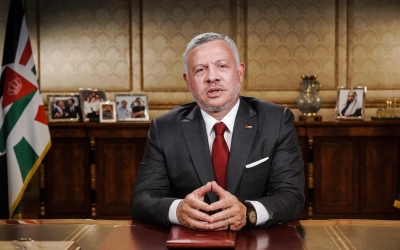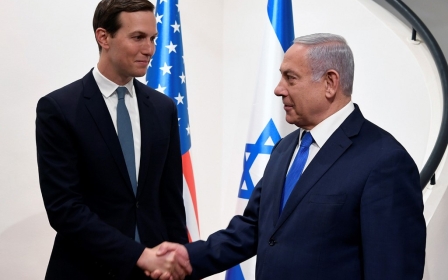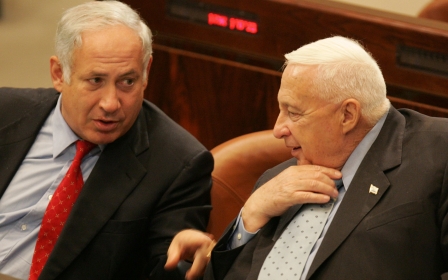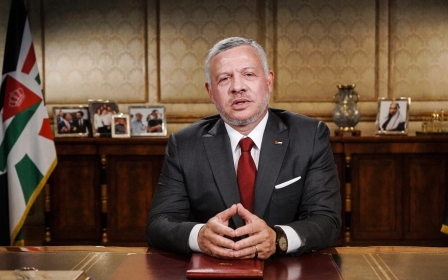Analysis: Israeli annexation will harm everyone and please nobody

If you meet an Israeli and wonder if they are “right” or “left”, just listen to the terminology they use.
If they insist on referring to the planned process of Israel appropriating the Jordan Valley and other large parts of the occupied West Bank as “applying sovereignty”, they are certainly a right-winger. If they use the term “annexation”, chances are this Israeli leans to the left, as the term is used to refer to a violation of international law.
The thought process is simple: right-wing logic says you cannot annex something that is yours to begin with.
Israel's planned annexation of the Jordan Valley: Why it matters
+ Show - HideThe annexation of the Jordan Valley could effectively kill whatever hopes remain for a two-state solution to the Israel-Palestine conflict as it would render completely impossible the establishment of a viable, contiguous Palestinian state.
In April, Prime Minister Benjamin Netanyahu reached an agreement with his rival Benny Gantz to form a unity government that seek to impose Israeli sovereignty over the Jordan Valley. Legislature could be discussed from 1 July.
The Jordan Valley accounts for around one-third of the occupied West Bank (almost 2,400 square kilometres), where 30 Israeli agricultural settlements house around 11,000 settlers.
Some 56,000 Palestinians also reside in the Jordan Valley, including in the city of Jericho, where their daily lives are deeply impacted by Israeli occupation policies.
The area is rich in minerals and agricultural soil and is a highly strategic area, as it lies along the Jordanian border.
Jordan, the Palestinian Authority in Ramallah, and senior officials in the European Union openly oppose the annexation plan, while the administration of US President Donald Trump has encouraged such moves.
It is not just the linguistics that divide Israelis into two almost equal halves.
According to a new opinion poll published by Israeli Democracy Institute (IDI) on 3 June, over half of Israelis support “applying Israeli sovereignty over Judea and Samaria”, by which they mean annexing the West Bank.
The level of support is surprising given most Israelis do not really know what it is all about.
Though Prime Minister Benjamin Netanyahu is still aiming for 1 July as his D-Day to launch the project, no roadmap has yet been presented.
What is more surprising is the fact that 58 percent of Israelis, according to the same poll, believe such a move will be followed by the outbreak of a third Intifada, or Palestinian uprising - meaning many of those supportive of annexation are very much aware of the cost of such a life-changing step.
'Palestinian riots cannot be defined as a price to pay for annexation... We can deal with it'
- Uzi Dayan, Likud MP
Uzi Dayan, an MP of Netanyahu's Likud party and retired major-general, is not just any clueless Israeli. He was the commander of an elite military unit and headed the Israeli National Security Council.
Dayan sounds honestly surprised when asked about the “price”.
“Palestinian riots cannot be defined as a price to pay for annexation,” he tells Middle East Eye. “We can deal with it.”
Despite being openly secular, Dayan echoed beliefs of many right-wing religious Israelis by citing Biblical reasoning for a very modern issue.
“The Jordan River has been the national border of Israel since Joshua crossed it opposite Jericho on his way to conquer the land of Canaan. It is back then that the Jordan River became the border of our kingdom,” he says.
“And, of course, it is a security border as well, that provides the strategic depth for the effective fight against terrorism.”
Not all senior security officials think like Dayan. In fact, a growing number talk openly against what they perceive as nothing less than a looming disaster.
“This is the underlying sentiment among generations of heads of security branches,” says Colonel (reserve) Gilead Sher, who served as chief of staff to Ehud Barak and chief negotiator in peace talks with the Palestinian leadership.
“They refer to annexation as a disaster. One thing is for sure: this is a nationally and internationally formative step not based on national interest, but rather on the political interest of the ruling government,” Sher, who is now a senior research fellow at the Institute for National Security Studies (INSS) and the Baker Institute in Houston, tells MEE.
In a Radio 103FM interview, the former head of the Shin Bet domestic intelligence agency, Yoram Cohen, described the timing of annexation as “a big mistake”.
“Why are we doing it,” he wondered. “Out of ideology?”
He left the question unanswered, insinuating other motivations.
Deliberate ambiguity
Just as Israel plunges into the most significant event since the 1967 Middle East war - which ended 53 years ago on Friday - confusion prevails.
On the one hand, the worldwide coronavirus pandemic provides what might be a convenient smokescreen.
World leaders are immersed in their own struggles against the plague. The United States is struggling with both Covid-19 and a soaring racial crisis.
On the other hand, this temporary distraction may in the future become a double-edged sword.
Politicians, defence officials and bewildered citizens ask themselves a long series of questions:
Does Netanyahu really want annexation - or is he waiting for a last-minute obstacle to pop up and allow him, at least for the time being, a graceful exit and way to save face at the same time?
What do Benny Gantz and Gabi Ashkenazi, the defence and foreign ministers from the Blue and White party, really want?
In the coalition agreement they signed with Netanyahu, they committed to “support annexation pending international and regional conditions”. If you fail to understand this intricate phrasing, you are not alone. Many in both the political and security arena ask themselves the very same question.
After all, both Gantz and Ashkenazi served as military chiefs of staff, and are very much aware of the long history of debates over annexation, a move that was rejected even by hawkish Ariel Sharon.
So far, they keep silent. Sources close to both insinuate they are acting behind the scenes to either postpone or minimise the scope and the significance of the act.
At this point, this tacit policy - if real - is certainly not sufficient.
“Any unilateral annexation - regardless of the percentage annexed - is strategically wrong for Israel. Politically wrong, diplomatically wrong, economically wrong. It is certainly wrong for the security of Israel,” Sher tells MEE.
“Framing annexation under the title of ‘applying sovereignty’ and security interest is plain manipulative.”
No upside
According to Sher, there is no upside to annexation, nor any advantage other than “satisfying the messianic needs” of Israeli religious-nationalists and Evangelists in the US, which form the support base of President Donald Trump, a staunch ally of Netanyahu.
“What it really means for Israel is the end of the Zionist vision and self-determination of Israel as a legitimate and moral entity. A certain level of ambiguity is deliberately preserved so that no one really knows the intentions and the possible outcome,” Sher adds.
“On the practical level, it takes us back to pre-Oslo (Accords) days and worsens Israel’s situation in all possible aspects,” Sher continues, adding that the policy is being pursued just because of the “whim” of Trump, “who allows this messianic pyromania, not understanding - or not caring - about its ramifications”.
When asked about other unilateral steps taken by Israel he deems successful, like the withdrawal from Lebanon in 2000 and disengagement from Gaza, Sher points out there is a big difference:
“In the two cases you mention, Israel actually left. The plan now is to move in, create a 1,400 km-long border and resume control over the lives of 250,000 Palestinians.”
An argument for annexation of the Jordan Valley often raised by Israelis is the mantra “this is what the Jordanians really want”, which has been repeated as if common wisdom. It is the belief that Jordan would rather have Israelis at its border, not Palestinians.
“This is worse than just patronising,” Oded Eran, former Israeli ambassador to Jordan, tells MEE, calling the attitude “wishful thinking”.
“It is true that Israel and Jordan may share a mutual interest in not having a Palestinian state, or at least a weakened one. But we have to bear in mind that east of Jordan River is the mirror image of everything happening on the west side,” he says. “When unrest or riots erupt in the West Bank, it has immediate implications on the situation in Jordan.”
The Jordanian government’s preference is actually moot, Eran argues.
“It really does not matter what Abdullah, king of Jordan, thinks deep in his heart. What matters is the official line that has not changed since 1967. It is integrated into the Arab Peace Initiative: a Palestinian state on occupied Palestinian territories with East Jerusalem as its capital and a just solution to the Palestinian refugee problem. That’s it,” he says.
“Therefore, all this guesswork as to what the king really thinks is irrelevant. Any riots or uprising on this side of the Jordan River will be reflected in what happens on the other side.”
A short time before the outbreak of coronavirus, Eran, now senior research fellow at the INSS, visited Amman and met with a senior official.
Eran refuses to get into the details of what he heard, saying only half jokingly: “I did not even bother to ask the person I met what he really thinks. I would have been thrown down the stairs.”
Over the years, Eran served as a negotiator in many talks with the Palestinians, and was deeply involved in the ins and outs of all failed peace plans and offered solutions. He notes that in all the years of his premiership, Netanyahu never mentioned annexation - until Trump came.
That major turning point does not serve any real Israeli interest, he notes.
Politics make for strange bedfellows. The debate over annexation certainly takes this common knowledge one step further. The more radical settlers, the cohort of Israelis expected to rejoice at the prospect of annexation, have instead turned against their supposed benefactor.
They left unhappy from the meeting they held with Netanyahu this week. He talked annexation and sovereignty, they heard “Palestinian state”.
For them, the annexation of 30 percent of the West Bank is not enough. David Elhayani, head of the Jordan Valley Regional Council and chair of Jewish communities in Judea and Samaria - the Israeli term for the West Bank - declared on Wednesday: “Trump is not a friend of Israel.”
It might be - just a thought - that when Trump finds himself in a national crisis at home and abroad, dealing with Israeli opposition on the left and on the right, it might in the end be too much. Even for a president who just a year ago called himself a ”stable genius”.
Middle East Eye propose une couverture et une analyse indépendantes et incomparables du Moyen-Orient, de l’Afrique du Nord et d’autres régions du monde. Pour en savoir plus sur la reprise de ce contenu et les frais qui s’appliquent, veuillez remplir ce formulaire [en anglais]. Pour en savoir plus sur MEE, cliquez ici [en anglais].



